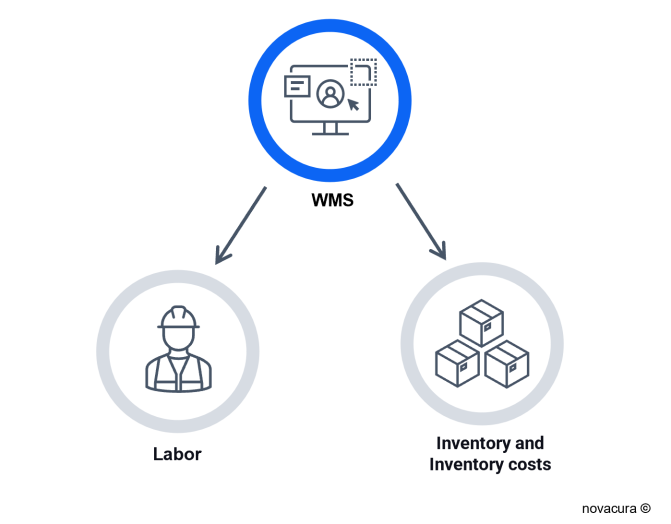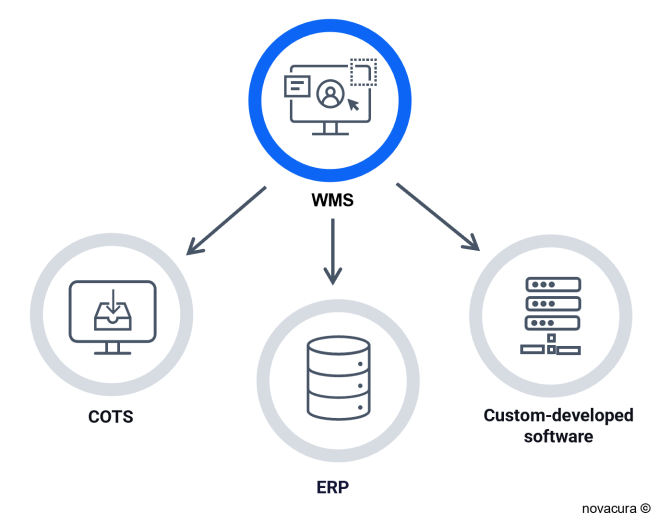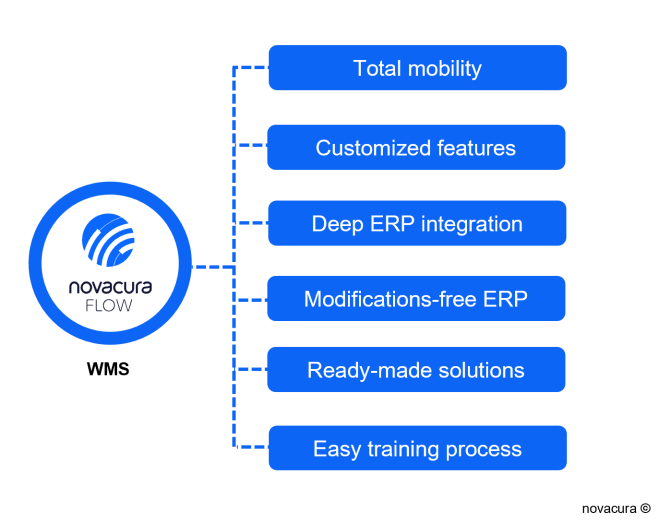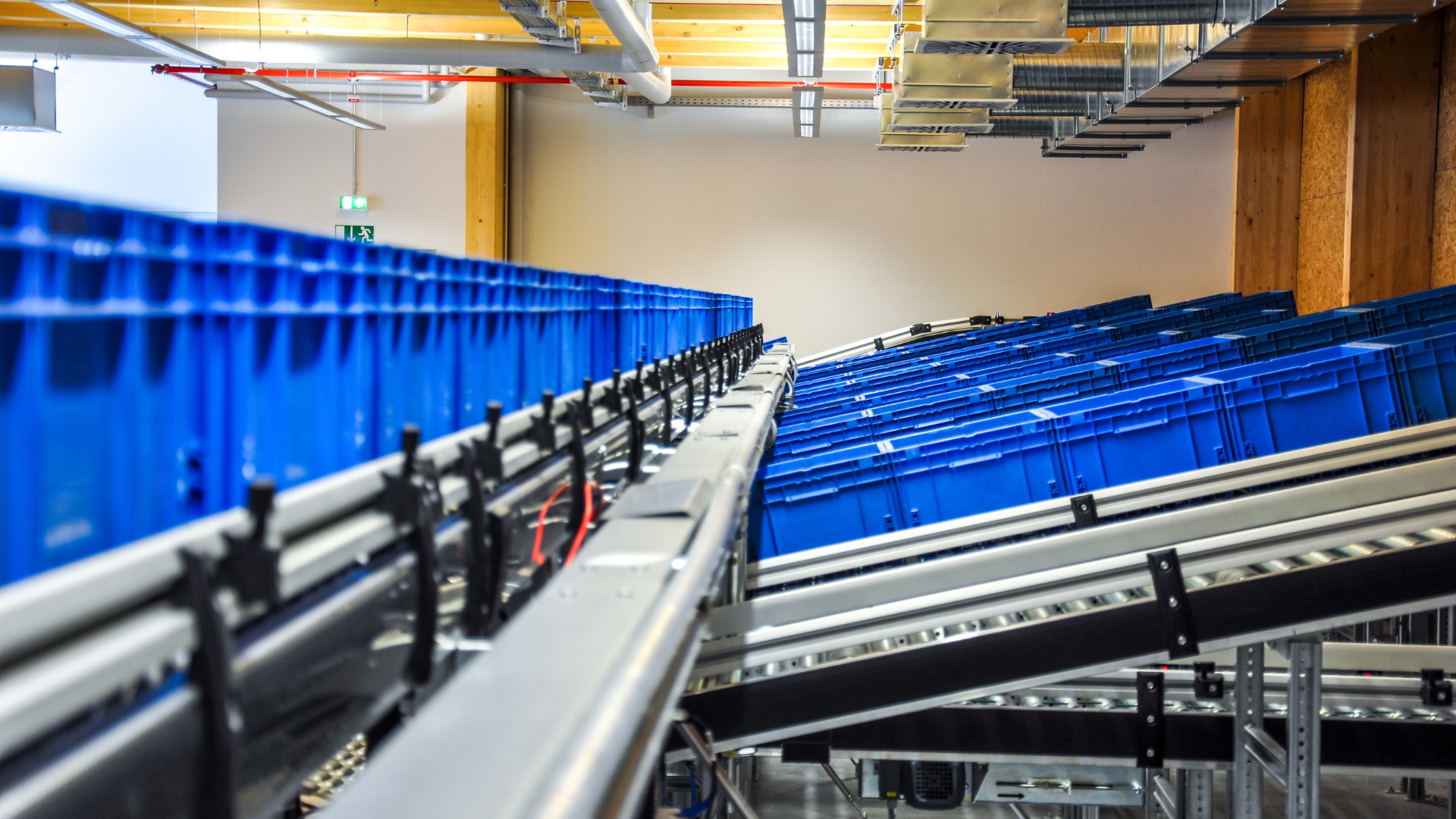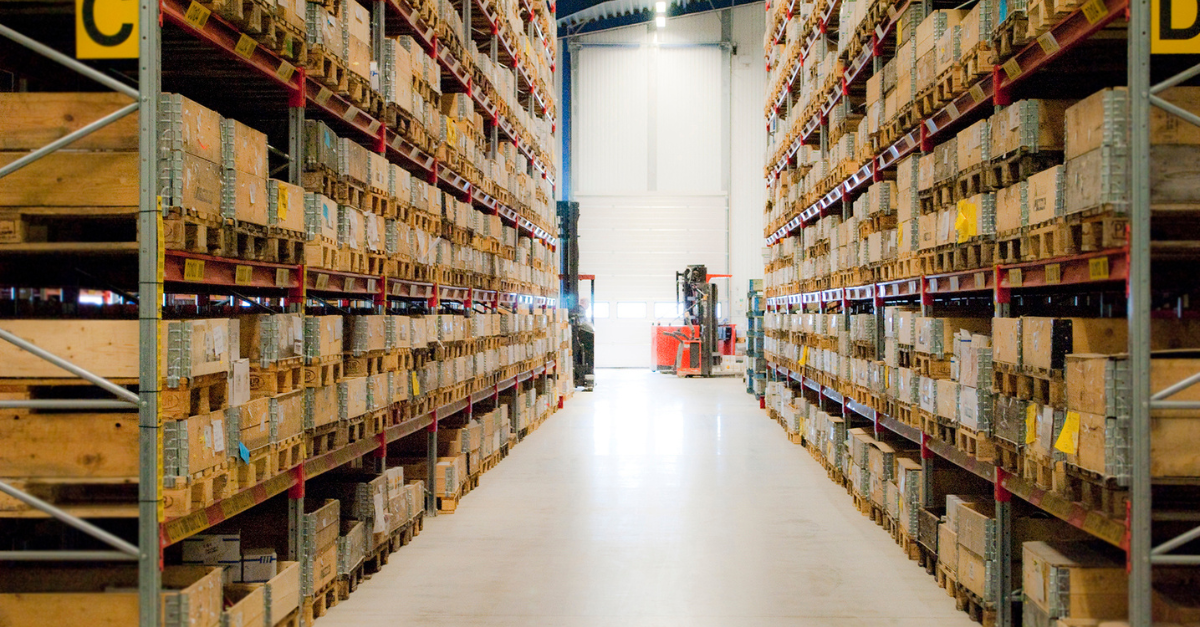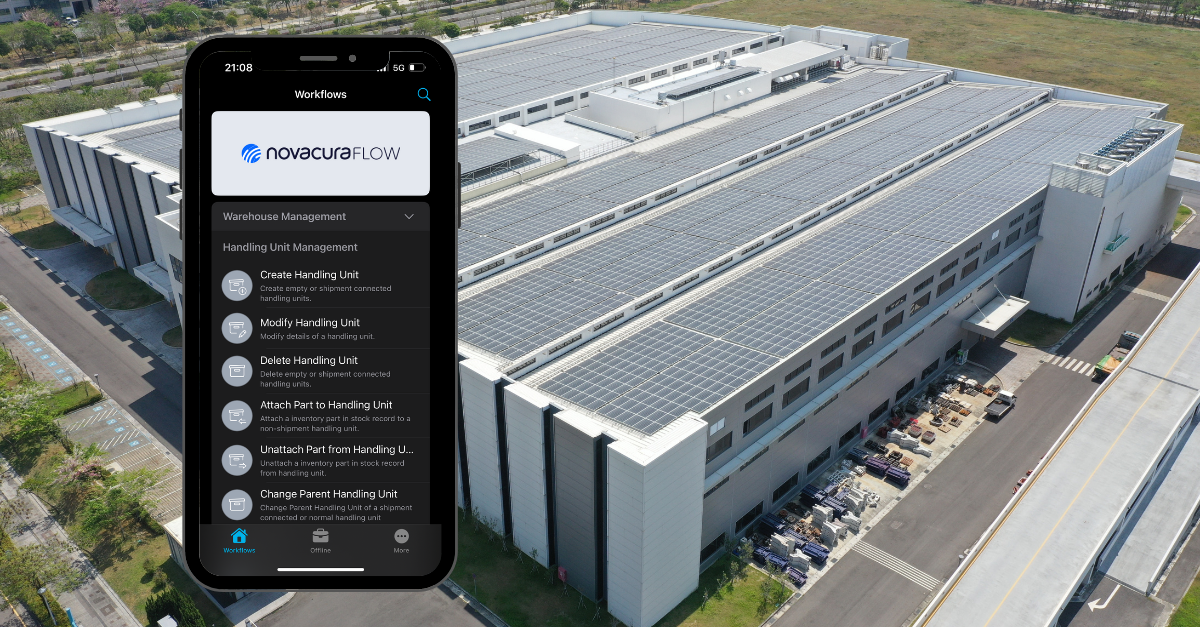Quality inspections of the production line using computer vision and Novacura Flow
If you work in manufacturing, you’re probably familiar with the challenge of avoiding defective products. A defect as small as a missing or unidentifiable barcode can result in downtime and disappointed customers. To limit the number of defective products, manufacturing companies struggle to manage these visual quality inspections. This article will introduce how to improve these inspections through computer vision for quality control – a field of artificial intelligence that trains computers to interpret and understand the visual world. Problem – the cost of quality inspections Every company in manufacturing has the challenge of reducing the number of defective products. Quality inspection in manufacturing is a must; otherwise, faulty products will appear one way or another. Defective products can cause damage and result in unexpected expenses, leading to customer complaints, downtime, labor costs, and scrapped products. Therefore, dedicated people are often used as the quality checkpoint, visually looking at the production line – which costs time and money. The quality check is critical, but manual visual quality inspection slows down the production phase since you must ensure the inspector can keep up with the production line. Is it worth it? Well, it’s necessary to ensure high-quality products – even though it’s a costly expense for the company. In some cases, where risk is high, the cost of letting defective products slip through is considered worse. E.g., delivering faulty products to a client/customer could result in lost contracts/agreements. Therefore, it’s essential to avoid these scenarios and reduce errors, even if that often means having a lot of resources in place and a slower production phase. A well-designed systematic quality inspection will have a positive effect on: Downtime Defective product Loss of revenue Lost customers Wasted time Wasted resources & man-hours Wasted money Decreased OEE / utilization And more.. In most cases, posting a person on the production line at each point of quality inspection is often too expensive – so let’s talk about alternatives using new technologies and solutions like computer vision. Solution – reducing defects and human errors by using computer vision analysis The solution is to install relatively inexpensive cameras in locations where you typically place, or would like to place, a person for visual inspections. By using digital images and video from these cameras, we can train computer vision models to perform analysis. These models enable the cameras to accurately identify and classify objects during production line inspections. An edge computing device processes each frame, performs the analysis, and ultimately outputs the result that the model was trained to generate. With these frames from a video, the model can be trained within a few hours to identify defects in real-time wherever you have repetitive quality inspections. We can then use this data to react to what the camera “sees.” Example 1: Best by dates on packaging Implementing object detection and quality control with computer vision on a packaging production line to detect valid printed Best By dates on packaging. This will allow the detection of misprinted, invalid, or missing Best By codes to be removed from production before being boxed and sent […]
learn more
WMS implementation in a manufacturing company: costs and scope
It is crucial for today’s warehouses, which are adjacent to a manufacturing facility, to meet customer expectations regarding high product quality and efficient distribution. If a company is considering potential cost-reduction strategies, a WMS is the most appropriate solution and can affect all operating expenses in the long term. Since many companies today look at warehousing costs as a percentage of sales or production costs, a WMS is a way to reduce overall warehousing and production costs. We have outlined a key framework on how to overcome bidding hurdles when contracting WMS software, which can minimize uncertainty among manufacturing and warehousing companies. WMS implementation costs Companies looking to implement a WMS must consider several elements and involve costs essential for a successful project launch. Audit fees – are required to prepare an entire business needs assessment to estimate the scope of further implementation. In many cases, companies that do not have in-house resources can use third-party consulting companies for WMS scope evaluation, which generates potential costs at the beginning of the implementation process. In some exceptions, third-party software companies can offer free on-site installed demos with consultancy; manufacturing companies can test software solutions before implementation. Information technology costs – WMS software can include several licenses as cost-per-user, which is a very affordable solution because the company can keep up with sustained growth and increase the supply of user licenses with increased operational demand. The IT costs include integration costs per system user and connector solutions for ERP systems, printer software, IoT connectors to manufacturing machines and robots, etc. Other costs are related to the environment, including development, testing phase, and production as user integration solutions. Nowadays, WMS software is offered in the SaaS model; therefore, companies must cover hosting Cloud costs or On-Premise maintenance, but these costs may instantly cover customer service support. Hardware costs – handheld barcode scanners are essential for seamless WMS operations, allowing employees to work remotely with other useful functions. This is the necessary equipment needed for any WMS to perform optimally. Final equipment needs are determined by internal requirements and can vary, but instead of purchasing equipment directly, a manufacturing company can use equipment leasing/rental, which provides a temporary business depreciation and lowers implementation costs. Indirect labor costs – supervision of the project by in-house personnel such as administrators, quality controllers, and procurement staff, including hours worked and wages with additional fees, which are assigned to the project by the company. These costs arise from collaboration between internal teams and third-party personnel from software vendors. Direct labor costs – on-site implementation of the project with support from a third-party software provider, including working hours booked for business consulting and support software developers. Labor hours relate to the development of the system environment, testing phases, and time required for the final production environment. Training costs – personnel training costs are generated while WMS is ready to Go-Live phase. In this case, the process is connected to overhanging manuals and explanation functionalities to operations staff. WMS software should provide maximum flexibility and easy to follow interface for mobile applications for […]
learn more
Job Safety Analysis: what it is & how to make it better
What is a Job Safety Analysis (JSA)? Safety is always a concern on the job site. Safety hazards can put workers in danger, cause serious illness or injury and potentially lead to devastating lawsuits. That’s why many businesses use the Job Safety Analysis (JSA) to help mitigate health and safety risks on work sites. But completing a JSA every day, for every job site, requires a lot of time and effort. It can be easy for workers to half-heartedly complete their JSAs, or ignore them altogether—which can lead to serious consequences. So today, we want to discuss the JSA process, and how you can make it easier using Novacura Flow. Why is it important to conduct a job safety analysis? A job safety analysis (JSA) is a critical first step in promoting workplace safety. By breaking down specific tasks to pinpoint potential hazards, a JSA helps reduce the chances of accidents and injuries, keeping workers safer on the job. In fields like construction, conducting a JSA before each shift and prior to starting work offers a proactive approach to identifying risks that might otherwise go unnoticed. Recognizing hazards early on provides an opportunity to address them, whether through elimination, substitution, or mitigation strategies, reducing the likelihood of incidents. Prevention is key—every accident avoided is a direct result of proactive safety measures and a commitment to zero-injury principles. A well-conducted JSA exemplifies this commitment, reinforcing that safety is not only a priority but a continuous process. For employers, job safety analysis brings additional benefits beyond worker protection. A thorough JSA can improve job site efficiency by reducing delays associated with unaddressed hazards and compliance issues. Identifying risks in advance allows employers to manage resources more effectively and ensure regulatory compliance, ultimately saving time and reducing operational costs. Though a JSA is just one part of a broader workplace safety program, its impact on reducing accidents and fostering a safe, compliant environment can be significant. How many JSAs should a company conduct? Ideally, you would conduct a JSA for every business process—but that takes a lot of time and effort. Focus your efforts on the processes: where previous injuries have occurred that are high-risk tasks You will need to update the JSA whenever conditions change. This can mean changes to equipment, location, or even weather: if the business process changes in any way, you need to review/update the JSA too. You should also review and update the JSA whenever injuries occur on the job. Best practice is to review, and update as required, prior to beginning the task. How to create a JSA Map the process Maybe you’ve already done this. If so, awesome! You’ve already built the foundation of a successful JSA. If not, you’ll want to start by breaking the process down into tasks. For example, if you were to create a JSA for drinking your morning cup of coffee, you might start with something like this: Task Hazard Recommendations Pour coffee in cup Add sugar to coffee in cup Drink coffee Identify the safety hazards associated with each step of the process For […]
learn more
How to improve material traceability in manufacturing
Inventory control over a long period of time can no longer rely on manual data entry using paper forms. The dependence on the manual data entry method cannot be verified in a short period of time and can cause inventory discrepancies that have serious financial implications for the organization. Traceability of goods in manufacturing requires digital inventory management software. Production clerks equipped in mobile devices with embedded software can take control of the entire inventory management process. Handheld computers and mobile scanners operating with barcodes, QR codes, RFID technology are able to ensure proper supervision of the internal flow of materials. Providing barcode material labels when products are inbounded is the solution that should be implemented in any factory. There is no doubt that the use of mobile devices with embedded operate software in manufacturing can influence all stages of production and increase its quality of: Material consumption – consumption registering and preventing shortage ofraw materials. Processing inbound – good traceability from dock registration to inventoryputaway process. Order picking – accurate collection from direct stock locations. Packing and pelletizing – easy determining delivery destination and good quality order checks. Outbound and shipping management – efficient dispatch and reliable ETA withtrack & trace. Inventory control – quick inventory control and accurate cycle count. What is manufacturing traceability? Manufacturing traceability refers to the ability to monitor and track materials, parts, and products—whether individually, by batch, lot, or shipment—throughout the entire manufacturing process and into the supply chain. This capability has evolved significantly from the days of manual records and paper-based tracking. The introduction of barcode technology was transformative, enabling manufacturers to track any item associated with a barcode, including raw materials, components, subcomponents, and finished goods. Modern manufacturing traceability systems go further by leveraging advanced tools like barcodes, RFID, and data analytics to provide real-time visibility into production processes, not just physical items. This comprehensive traceability begins the moment raw materials and parts enter production and continues until the final product exits the facility. By offering detailed insights into each stage of production, today’s systems help manufacturers ensure quality, boost efficiency, and maintain regulatory compliance, ultimately enhancing operational control and customer satisfaction. Manufacturing in the COVID-19 era – Top 3 challenges and how to overcome them (PDF) Top 3 challenges for manufacturers during the pandemic What are the root causes of the challenges? Proposed solution How to implement iT Download Effective traceability of materials Embedded software connected to ERP systems can be enough to fulfil general needs of particular warehouse management but its customization is almost impossible. Modification of ERP system is difficult and time consuming therefore any sort of random software cannot be suitable for complexity of production process. The manufacturing industry is closely dependent on the dynamic changes occurring in each industry sector. Ongoing changes regarding market demand are forcing factories to respond. Adjusting production lines and Warehouse Management Systems (WMS) is already part of its strategy. To secure effective material traceability, manufacturing facilities should consider selecting the most appropriate solution with the possibility of flexible software modification. The software should not only be suitable for the existing hardware, but […]
learn more
9 ways to meet e-commerce requirements for your warehouse
Almost overnight, the pandemic fundamentally changed the way businesses operate. Many retail stores were forced to close, global supply chains were disrupted, and consumers shifted their focus to online purchases. Warehouses, often regarded as a back-end function, were now front and center and had to shift from fulfilling large retail orders to selling individual items directly to consumers. As a result, the need for a comprehensive e-commerce fulfillment strategy – centered around the warehouse – has never been greater. In this article, we explore nine practical and essential ways to align your warehouse operations with modern e-commerce needs. From integrating inventory management systems to optimizing packaging and returns processes, each step aims to streamline workflows, improve visibility, and enhance flexibility within the warehouse environment. These custom solutions ensure that your warehouse can adapt to fluctuating demand and deliver a seamless experience, ultimately strengthening the foundation for growth and sustainability in the evolving landscape of e-commerce. 1. Invest in an e-commerce solution that’s connected to your warehouse E-commerce popularity was growing before the pandemic began, but COVID-19 massively accelerated the growth for as much as 4 to 6 years, according to a recent Forbes report. The boost in online sales, while great, came with its own set of challenges. Most warehouses were not equipped to handle the influx of online sales, especially when selling directly to the consumer. New safety protocols, personnel shortages and supply chain delays compounded the issues further, highlighting the need for a comprehensive e-commerce strategy tightly integrated throughout the warehouse. Online communication between your e-commerce platform and warehouse management solution (WMS) is key to making better-informed decisions and having visibility throughout your warehouse. Technology solutions, like Novacura Flow (low-code platform and integration platform), enable you to connect your existing e-commerce platform to your WMS. This integration provides immediate online access to information such as current stock levels, order processing status, and online reservation of goods when they are sold. But this is not the end – Novacura Flow platform can help implement the “Omni-channel” strategy. The platform can integrate physical stores and e-commerce platforms and effectively manage all reservations from all channels. 2. Monitor warehouse activities in real-time Customer demand is often hard to predict and can quickly fluctuate based on a change in a situation or priorities. Governmental regulations, extreme weather events, and social media can all influence overall demand and the demand between channels (purchases made in retail stores vs. online). For example, not many could have predicted the toilet paper shortage that resulted from COVID-19. Still, there are steps your business can take to make better-informed decisions and react more quickly to fluctuations in demand. Warehouse activity can, and should be, monitored minute-by-minute online using e-commerce software solution, like Novacura Flow, so that you can be alerted to trend changes as they arise. By integrating your e-commerce with your warehouse, you will no longer have to guess where an item is within the warehouse or wonder where an order is in the process. Instead, you’ll be able to see exactly where everything […]
learn more
Shop Floor Data Collection Software: How to integrate equipment with business systems
To manage means to measure. And your management decisions are as good as the quality of data you used to base them on. Management decisions are made based on “business systems” (Reporting systems – business intelligence, ERP systems, Planning systems APS, MES systems). But these systems have problems with acquiring appropriate information from original information sources. Integrating the systems would be a solution to this, but it’s challenging due to two problems: On the Shop floor side – different devices have different protocols, some are new and some can be over ten years old. There are various business systems on the IT Systems side (APS, MES, ERP, MRP, WMS, QMS). They all use different protocols, provide other information and have independent databases (usually not synchronized). What Is Shop Floor Control Software? Shop Floor Control (SFC) software typically – but not always – part of a Manufacturing Execution System (MES), is a tool that captures, compiles, and analyzes the data needed to make your manufacturing tractable. This set of software constantly gathers data on human input as well as automated systems to inform what is happening right on the shop floor as work is in progress. With shop floor management software, you gain the ability to monitor every detail of factory activity in real time. Detailed reports can reveal essential metrics such as machine runtime, material usage, work remaining, and overall production efficiency. These insights empower managers to make timely, informed decisions that can improve productivity and reduce downtime. Moreover, SFC software can provide a broad perspective that spans multiple departments, individual machines, or even various manufacturing sites. This capability allows for the tracking of key performance indicators (KPIs) from numerous data sources, offering a comprehensive view of the factors driving your company’s production performance. By leveraging SFC software, businesses can pinpoint areas for improvement and better understand the variables influencing their overall output, helping to optimize operations and support continuous improvement across facilities. Solution The low-code BPM platform, Novacura Flow can integrate with all devices on the shop floor side as well as all systems on the IT side. This makes it an ideal solution for bridging the gap between equipment and business systems. Protocols that Novacura Flow support – by devices side How we can communicate with different products: Via a rest-based IoT-Hub, as Azure IoT Via a OPC-UA server Via a machines PLC over ModBus Directly with a machine over TCP/IP Directly from the Novacura Flow-app with a device over BLE (Bluetooth Low Energy) What type of equipment can we connect? Production Robots – automatically read all information, detect downtime, track the number of cycles, and identify alerts. Vision AI cameras – to identify mistakes, take action and record the “incident” for quality purposes Semi-automated Machines used for production – like CNC, 3D Printers – as above, to read information about performance progress, number of prepared components, downtime, alert detection Different gauges/measurers – measure various parameters on the shop floor, such as dust, humidity, temperature, noise, vibrations, and power consumption (including voltage and amperage). Internal access control system – to monitor if a worker leaves or […]
learn more
 December 2, 2024
December 2, 2024  8 min to read
8 min to read 